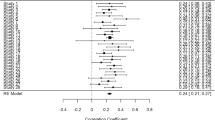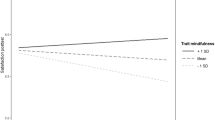Abstract
Trait mindfulness has been linked to romantic relationship satisfaction, but what are the mechanisms of action that give rise to this association? The current study tested the possible mechanism of perceived responsiveness in a partner (i.e., perceiving that a romantic partner is understanding, validating, and caring) who had the opportunity to provide support. We hypothesized that individuals higher in trait mindfulness would rate their partners higher in responsiveness, which in turn would predict greater relationship satisfaction in the rater. We also examined a cross-dyad path, in which partners of more mindful participants would view them as more responsive and thus have greater relationship satisfaction. In a laboratory study, each member of 127 heterosexual couples (n = 254) completed measures of trait mindfulness and relationship satisfaction. Couple members later took turns discussing a personal concern and then reported their partner’s responsiveness during that conversation. An actor-partner interdependence mediation model revealed that perceived responsiveness mediated the mindfulness and relationship satisfaction association. Participants higher in Non-judgment and Observing facets of trait mindfulness rated their partners higher in responsiveness, which predicted relationship satisfaction. In addition, participants higher in Acting with Awareness both (1) rated their partners as higher in responsiveness, and (2) were perceived by their partners as more responsive, with both paths mediating effects on relationship satisfaction. The results for Acting with Awareness, however, should be interpreted with caution, due to poor model fit. Thus, mindfulness may facilitate relationship satisfaction through heightened perception of partners’ responsiveness both within and across dyads.


Similar content being viewed by others
References
Algoe, S. B., Fredrickson, B. L., & Gable, S. L. (2013). The social functions of the emotion of gratitude via expression. Emotion, 13(4), 605–609. https://doi.org/10.1037/a0032701.
Algoe, S. B., Kurtz, L. E., & Hilaire, N. M. (2016). Putting the ‘you’ in ‘thank you’: examining other-praising behavior as the active relational ingredient in expressed gratitude. Social Psychological and Personality Science, 7(7), 658–666. https://doi.org/10.1177/1948550616651681.
Aron, A., & Aron, E. N. (1997). Self-expansion motivation and including other in the self. In S. Duck & S. Duck (Eds.), Handbook of personal relationships: theory, research and interventions (2nd ed., pp. 251–270). Hoboken, NJ, US: John Wiley & Sons Inc.
Atkinson, B. J. (2013). Mindfulness training and the cultivation of secure, satisfying couple relationships. Couple and Family Psychology: Research and Practice, 2(2), 73–94. https://doi.org/10.1037/cfp0000002.
Baas, M., Nevicka, B., & Ten Velden, F. S. (2014). Specific mindfulness skills differentially predict creative performance. Personality and Social Psychology Bulletin, 40(9), 1092–1106. https://doi.org/10.1177/0146167214535813.
Baer, R. A., Smith, G. T., Hopkins, J., Krietemeyer, J., & Toney, L. (2006). Using self-report assessment methods to explore facets of mindfulness. Assessment, 13(1), 27–45. https://doi.org/10.1177/1073191105283504.
Barnes, S., Brown, K., Krusemark, E., Campbell, W., & Rogge, R. D. (2007). The role of mindfulness in romantic relationship satisfaction and responses to relationship stress. Journal of Marital and Family Therapy, 33(4), 482–500. https://doi.org/10.1111/j.1752-0606.2007.00033.x.
Becerra, R., Dandrade, C., & Harms, C. (2016). Can specific attentional skills be modified with mindfulness training for novice practitioners? Current Psychology: A Journal For Diverse Perspectives On Diverse Psychological Issues. https://doi.org/10.1007/s12144-016-9454-y.
Bentler, P. M. (1990). Comparative fit indexes in structural models. Psychological Bulletin, 107(2), 238–246. https://doi.org/10.1037/0033-2909.107.2.238.
Bihari, J. N., & Mullan, E. G. (2014). Relating mindfully: a qualitative exploration of changes in relationships through mindfulness-based cognitive therapy. Mindfulness, 5(1), 46–59. https://doi.org/10.1007/s12671-012-0146-x.
Bishop, S. R., Lau, M., Shapiro, S., Carlson, L., Anderson, N. D., Carmody, J., et al. (2004). Mindfulness: a proposed operational definition. Clinical Psychology: Science and Practice, 11(3), 230–241. https://doi.org/10.1093/clipsy/bph077.
Bluth, K., Roberson, P. E., Billen, R. M., & Sams, J. M. (2013). A stress model for couples parenting children with autism spectrum disorders and the introduction of a mindfulness intervention. Journal of Family Theory & Review, 5(3), 194–213. https://doi.org/10.1111/jftr.12015.
Brown, K., & Ryan, R. M. (2003). The benefits of being present: mindfulness and its role in psychological well-being. Journal of Personality and Social Psychology, 84(4), 822–848. https://doi.org/10.1037/0022-3514.84.4.822.
Carson, J. W., Carson, K. M., Gil, K. M., & Baucom, D. H. (2004). Mindfulness-based relationship enhancement. Behavior Therapy, 35(3), 471–494. https://doi.org/10.1016/S0005-7894(04)80028-5.
Collins, N. L., & Feeney, B. C. (2000). A safe haven: an attachment theory perspective on support seeking and caregiving in intimate relationships. Journal of Personality and Social Psychology, 78(6), 1053–1073. https://doi.org/10.1037/0022-3514.78.6.1053.
Cook, W. L., & Kenny, D. A. (2005). The actor-partner interdependence model: a model of bidirectional effects in developmental studies. International Journal of Behavioral Development, 29, 101–109. https://doi.org/10.1080/01650250444000405.
Debrot, A., Cook, W. L., Perrez, M., & Horn, A. B. (2012). Deeds matter: daily enacted responsiveness and intimacy in couples’ daily lives. Journal of Family Psychology, 26(4), 617–628. https://doi.org/10.1037/a0028666.
Feldman, G., Lavallee, J., Gildawie, K., & Greeson, J. M. (2016). Dispositional mindfulness uncouples physiological and emotional reactivity to a laboratory stressor and emotional reactivity to executive functioning lapses in daily life. Mindfulness, 7(2), 527–541. https://doi.org/10.1007/s12671-015-0487-3.
Friese, M., & Hofmann, W. (2016). State mindfulness, self-regulation, and emotional experience in everyday life. Motivation Science, 2(1), 1–14. https://doi.org/10.1037/mot0000027.
Gable, S. L., Gonzaga, G. C., & Strachman, A. (2006). Will you be there for me when things go right? Supportive responses to positive event disclosures. Journal of Personality and Social Psychology, 91(5), 904–917. https://doi.org/10.1037/0022-3514.91.5.904.
Hendrick, S. S. (1988). A generic measure of relationship satisfaction. Journal of Marriage and the Family, 50, 93–98.
Hertz, R. M., Laurent, H. K., & Laurent, S. M. (2015). Attachment mediates effects of trait mindfulness on stress response to conflict. Mindfulness, 6(3), 483–489. https://doi.org/10.1007/s12671-014-0281-7.
Hodgins, H. S., & Adair, K. C. (2010). Attentional processes and meditation. Consciousness and Cognition, 19, 39–878. https://doi.org/10.1016/j.concog.2010.04.002.
Johns, K. N., Allen, E. S., & Gordon, K. C. (2015). The relationship between mindfulness and forgiveness of infidelity. Mindfulness, 6(6), 1462–1471. https://doi.org/10.1007/s12671-015-0427-2.
Jones, K. C., Welton, S. R., Oliver, T. C., & Thoburn, J. W. (2011). Mindfulness, spousal attachment, and marital satisfaction: a mediated model. The Family Journal: Counseling and Therapy for Couples and Families, 19(4), 357–361. https://doi.org/10.1177/1066480711417234.
Kabat-Zinn, J. (1993). Mindfulness meditation: health benefits of an ancient Buddhist practice. In D. Goleman & J. Garin (Eds.), Mind⁄body medicine (pp. 259–276). Yonkers, NY: Consumer Reports.
Kabat-Zinn, J. (1994). Wherever you go, there you are: mindfulness meditation in everyday life. New York: Hyperion.
Karremans, J. C., Schellenkens, M. P., & Kappen, G. (2015). Bridging the science of mindfulness and romantic relationships: a theoretical model and research agenda. Personality and Social Psychology Review, 1–21. https://doi.org/10.1177/1088868315615450.
Khaddouma, A., Gordon, K. C., & Bolden, J. (2015a). Zen and the art of dating: mindfulness, differentiation of self, and satisfaction in dating relationships. Couple and Family Psychology: Research and Practice, 4(1), 1–13. https://doi.org/10.1037/cfp0000035.
Khaddouma, A., Gordon, K. C., & Bolden, J. (2015b). Zen and the art of sex: Examining associations among mindfulness, sexual satisfaction, and relationship satisfaction in dating relationships. Sexual and Relationship Therapy, 30(2), 268–285. https://doi.org/10.1080/14681994.2014.992408.
Khaddouma, A., Gordon, K. C., & Strand, E. B. (2016). Mindful mates: a pilot study of the relational effects of mindfulness-based stress reduction on participants and their partners. Family Process. https://doi.org/10.1111/famp.12226.
Kozlowski, A. (2013). Mindful mating: exploring the connection between mindfulness and relationship satisfaction. Sexual and Relationship Therapy, 28(2), 92–104. https://doi.org/10.1080/14681994.2012.748889.
Laurenceau, J., Barrett, L. F., & Rovine, M. J. (2005). The interpersonal process model of intimacy in marriage: a daily-diary and multilevel modeling approach. Journal of Family Psychology, 19(2), 314–323. https://doi.org/10.1037/0893-3200.19.2.314.
Ledermann, T., Macho, S., & Kenny, D. A. (2011). Assessing mediation in dyadic data using the actor-partner interdependence model. Structural Equation Modeling: A Multidisciplinary Journal, 18(4), 595–612. https://doi.org/10.1080/10705511.2011.607099.
Maisel, N. C., & Gable, S. L. (2009). The paradox of received social support: the importance of responsiveness. Psychological Science, 20(8), 928–932. https://doi.org/10.1111/j.1467-9280.2009.02388.x.
Maisel, N. C., Gable, S. L., & Strachman, A. (2008). Responsive behaviors in good times and in bad. Personal Relationships, 15, 317–338. https://doi.org/10.1111/j.1475-6811.2008.00201.x.
McBee, M. (2010). Modeling outcomes with floor or ceiling effects: a brief introduction to the Tobit model. Gifted Child Quarterly, 54, 314–320.
McGill, J., Adler-Baeder, F., & Rodriguez, P. (2016). Mindfully in love: a meta-analysis of the association between mindfulness and relationship satisfaction. Journal of Human Sciences and Extension, 4, 89–101.
Muthén, B. O. (1989). Tobit factor analysis. British Journal of Mathematical and Statistical Psychology, 42(2), 241–250. https://doi.org/10.1111/j.2044-8317.1989.tb00913.x.
Muthén, L. K., & Muthén, B. O. (1998-2015). Mplus user’s guide (7th ed.) [Computer software manual]. Los Angeles, CA: Muthén & Muthén.
Pakenham, K. I., & Samios, C. (2013). Couples coping with multiple sclerosis: a dyadic perspective on the roles of mindfulness and acceptance. Journal of Behavioral Medicine, 36(4), 389–400. https://doi.org/10.1007/s10865-012-9434-0.
Pepping, C. A., & Duvenage, M. (2016). The origins of individual differences in dispositional mindfulness. Personality and Individual Differences, 93, 130–136. https://doi.org/10.1016/j.paid.2015.05.027.
Pepping, C. A., & Halford, W. K. (2016). Mindfulness and couple relationships. In E. Shonin, W. Van Gordon, M. D. Griffiths, E. Shonin, W. Van Gordon, & M. D. Griffiths (Eds.), Mindfulness and Buddhist-derived approaches in mental health and addiction (pp. 391–411). Cham: Springer International Publishing. https://doi.org/10.1007/978-3-319-22255-4_19.
Preacher, K. J., & Kelly, K. (2011). Effect size measures for mediation models: quantitative strategies for communicating indirect effects. Psychological Methods, 16(2), 93–115. https://doi.org/10.1037/a0022658.
Preacher, K. J., & Selig, J. P. (2012). Advantages of Monte Carlo confidence intervals for indirect effects. Communication Methods and Measures, 6(2), 77–98. https://doi.org/10.1080/19312458.2012.679848.
Reis, H. T. (2003). A self-report measure of perceived partner responsiveness. Unpublished data, University of Rochester.
Reis, H. T., Clark, M. S., & Holmes, J. G. (2004). Perceived partner responsiveness as an organizing construct in the study of intimacy and closeness. In D. J. Mashek & A. P. Aron (Eds.), Handbook of closeness and intimacy (pp. 201–225). Mahwah, NJ: Erlbaum.
Shapiro, S. L., Schwartz, G. E., & Bonner, G. (1998). Effects of mindfulness-based stress reduction on medical and premedical students. Journal of Behavioral Medicine, 21(6), 581–599. https://doi.org/10.1023/A:1018700829825.
Shaver, P. R., Lavy, S., Saron, C. D., & Mikulincer, M. (2007). Social foundations of the capacity for mindfulness: an attachment perspective. Psychological Inquiry, 18, 264–271.
Snyder, R., Shapiro, S., & Treleaven, D. (2012). Attachment theory and mindfulness. Journal of Child and Family Studies, 21(5), 709–717. https://doi.org/10.1007/s10826-011-9522-8.
Steiger, J. H. and Lind, J. (1980). Statistically-based tests for the number of common factors. Paper presented at the Annual Spring Meeting of the Psychometric Society, Iowa City.
Wachs, K., & Cordova, J. V. (2007). Mindful relating: exploring mindfulness and emotion repertoires in intimate relationships. Journal of Marital and Family Therapy, 33(4), 464–481. https://doi.org/10.1111/j.1752-0606.2007.00032.x.
Welwood, J. (1996). Love and awakening. New York: HarperCollins.
Williams, A. M., & Cano, A. (2014). Spousal mindfulness and social support in couples with chronic pain. The Clinical Journal of Pain, 30(6), 528–535. https://doi.org/10.1097/AJP.0000000000000009.
Williams, M. J., Dalgleish, T., Karl, A., & Kuyken, W. (2014). Examining the factor structures of the five facet mindfulness questionnaire and the self-compassion scale. Psychological Assessment, 26(2), 407–418. https://doi.org/10.1037/a0035566.
Wittmann, M., Peter, J., Gutina, O., Otten, S., Kohls, N., & Meissner, K. (2014). Individual differences in self-attributed mindfulness levels are related to the experience of time and cognitive self-control. Personality and Individual Differences, 64, 41–45. https://doi.org/10.1016/j.paid.2014.02.011.
Acknowledgements
We are particularly grateful to Ansley Foster, Alysa Dalbo, and Ayush Kaushish for conducting the behavior coding. We would also like to express our sincere appreciation for feedback on this manuscript from the graduate student members of the third author’s lab as well as Patrick Dwyer and Barbara Fredrickson. The names of the hardworking members of the research teams who contributed to this project may be found on the website of the third author.
Funding
This work was supported by the Expanding the Science and Practice of Gratitude Project run by UC Berkeley’s Greater Good Science Center in partnership with UC Davis with funding from the John Templeton Foundation, awarded to the third author.
Author information
Authors and Affiliations
Contributions
KCA: developed the research question and hypotheses, analyzed the data, and wrote the paper. AJB: developed the analytic plan, analyzed the data, wrote sections of the methods and results, and edited the manuscript. SBA: designed and executed the study, helped develop the hypotheses and the data analytic plan, and assisted in writing and editing the manuscript.
Corresponding author
Ethics declarations
All procedures performed in studies involving human participants were in accordance with the ethical standards of the institutional and/or national research committee and with the 1964 Helsinki declaration and its later amendments or comparable ethical standards. This study was approved by the Institutional Review Board at the University of North Carolina at Chapel Hill. All participants provided informed consent.
Conflict of Interest
The authors declare that they have no conflict of interest.
Electronic supplementary material
ESM 1
(DOCX 14 kb)
Rights and permissions
About this article
Cite this article
Adair, K.C., Boulton, A.J. & Algoe, S.B. The Effect of Mindfulness on Relationship Satisfaction via Perceived Responsiveness: Findings from a Dyadic Study of Heterosexual Romantic Partners. Mindfulness 9, 597–609 (2018). https://doi.org/10.1007/s12671-017-0801-3
Published:
Issue Date:
DOI: https://doi.org/10.1007/s12671-017-0801-3




